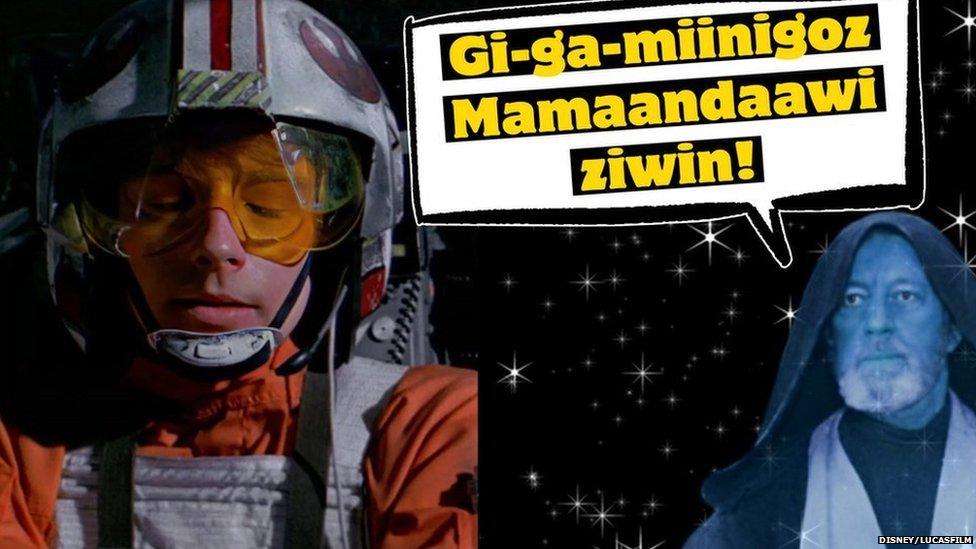Star Wars translated into indigenous Ojibwe language
- Published
- comments

The very first Star Wars film is being translated into Anishinaabemowin, also known as Ojibwe, an indigenous language spoken by the Ojibwe people in North America.
Auditions will be held in the Canadian city of Winnipeg in early 2024 where actors will read lines first made famous in the 1977 film.
Phrases such as "May the Force be with you", will be spoken in the Ojibwe language for the first time on film and translates as "Gi-ga-miinigoz Mamaandaawiziwin".
A member of the Ojibwa tribe in North America
The University of Manitoba and the Dakota Ojibwe Tribal Council - which represents several first nation groups - is working with Disney and Lucasfilm to accurately translate the movie into Anishinaabemowin with backing from the Canadian government.
It's hoped that translating the movie will help to preserve the Ojibwe language which is widely spoken in the Canadian province of Manitoba and Ontario and the US state of Minnesota.
Since it was first released in 1977, the Star Wars films have been translated into more than 50 languages.
In a similar move in 2013, the first movie in the saga, Star Wars: A New Hope was the first major motion picture movie to be dubbed into the Navajo Native American language.
If you cannot see the quiz, click here.
Star Words
A recent university study has found that words from the Star Wars movies are often used as part of the English language.
The research by Chemnitz University of Technology in Germany suggests that people routinely use words such as: Yoda, Jedi, Padawan and lightsaber, and talk about turning to the 'dark side', when doing something bad.
"I wanted to find out whether words from the 'Star Wars' universe have already become part of our own universe," says Prof Dr. Christina Sanchez-Stockhammer who adds that many phrases or characters are familiar to those who may not have seen the films.
"'Star Wars'" has become such an important part of popular culture that Yoda's role as a mentor or the appearance of lightsabers can be assumed to be familiar to large sections of the population."
A study in Germany found that words such as Yoda and lightsaber are regularly used in the English language
The Star Wars words and phrases were looked for in published texts as far back as the 1980s, as well as 11.5 million words recorded from conversations in British homes for another study on language which took place between 2012 and 2016.
Sanchez-Stockhammer says 'Star Wars'-words often pop up more than many regular words, with no direct reference to movies at all.
"I've been a Star Wars fan for a long time, but really realised how important Star Wars has become in everyday language when the US politician Nancy Pelosi accused the former Speaker of the House of Representatives of going to the 'dark side'."
Lightsaber, Jedi, and Padawan were added to the Oxford English Dictionary in 2019, with Yoda included since 2016 and "the dark side" since 2021.
- Published28 February 2019
- Published12 December 2019
